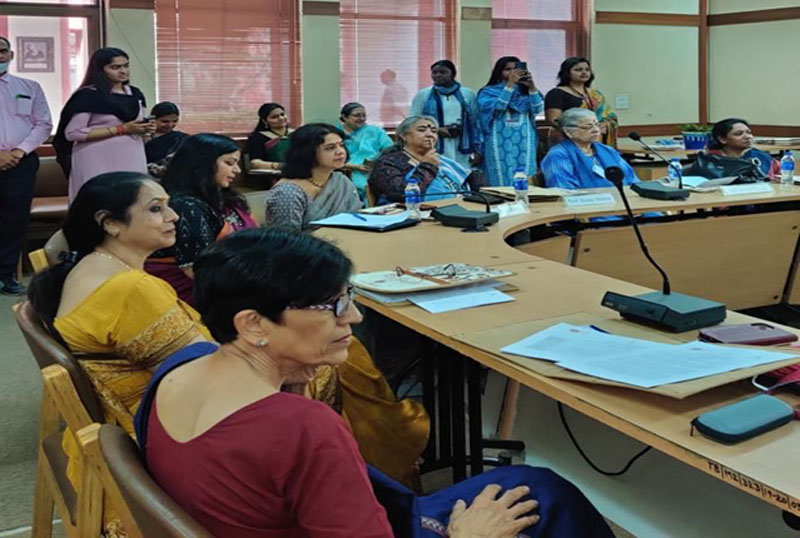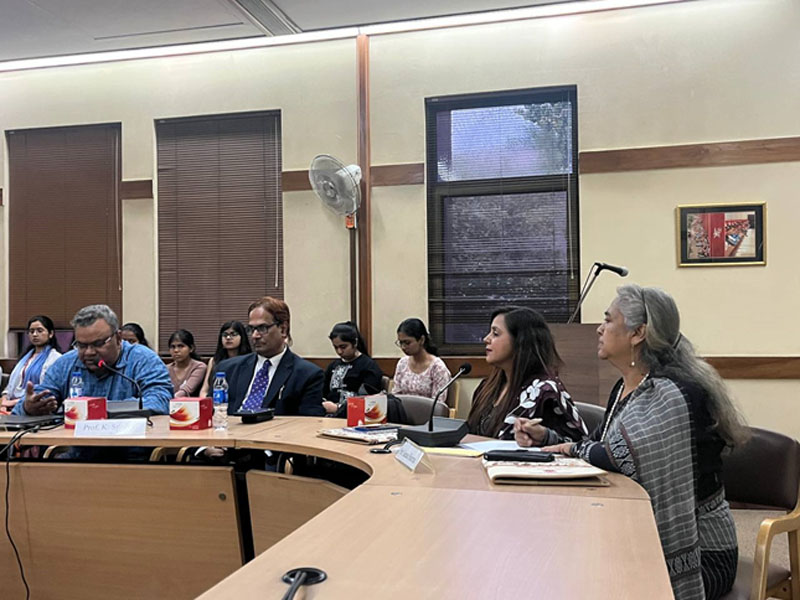A two-day National seminar titled ‘National Education Policy 2020: Themes and Perspectives’, sponsored by the Indian Council of Social Science Research (ICSSR), was organized by the Department of Elementary Education at Lady Shri Ram College for Women on March 29 and 31, under the guidance of Principal Prof. Suman Sharma and conevnor Dr. Tripti Bassi.
The seminar was inaugurated by Ms. Alice Vaz R., Principal Secretary, Higher Education, GNCT. In her inaugural address, Ms. Alice outlined the NEP 2020’s focus on developing rationality, creativity, and critical thinking skills among learners. Prof. Karuna Chanana, former chair and professor, School of Social Sciences, JNU, in her keynote address, hailed the policy as a much-needed step after a long gap of 34 years since NPE 1986. While she appreciated the policy’s efforts to acknowledge teachers as the catalyst for fundamental reforms and its focus on historically marginalised children, she pointed out that more space could have been given to the discourse of gender.

Prof. C.B. Sharma, School of Education, IGNOU, declared the policy to be ‘revolutionary’ for its increased emphasis on native language as the medium of instruction, toy pedagogy, flexibility, assessment reforms, and provisions made for increased accessibility to quality education by more girls. Mr. Saurav Banerjee, Country Director, Room to Read, shared the importance of focusing on foundational literacy and numeracy under the NIPUN Bharat Mission and reiterated the significance of using learners’ native languages as the medium of instruction up until Grade 5, as espoused strongly in the policy.
Prof. Pawan Sinha, Department of Political Science, University of Delhi, discussed how the framework of the NEP 2020 is rooted in the Indian philosophical and political thought tradition and focuses on multilingualism, an indigenous system of education and discussion based pedagogy. Prof. Arvind Kumar Mishra, School of Social Sciences, JNU, deliberated on the need to use social sciences as a tool to develop critical thinking and uncover the nuances of the social world. Dr. Rajneesh Gupta, Central University of Gujrat, discussed how his university has implemented various recommendations made by the policy, such as, offering multiple exit points and a multidisciplinary approach to higher education courses.
Talking on equity and inclusivity in NEP 2020, Prof. Rama Meganathan, Department of Education and Languages, NCERT, drew attention towards early introduction of several languages during the primary stage in NEP 2020, particularly towards the plight of learners with tribal languages. Ms. Yogita Nishad from Barefoot College shared the inclusive practices followed by her organization for making quality education accessible to children belonging to the marginalized communities. Prof. Yogesh Gupta, Department of Political Science, University of Delhi, argued that all policies need to be seen as the manifestation of people’s aspirations, thus foregrounding the relevance of the current policy as the need of the hour.
Prof. Nita Kumar, Director, Vidhyashram: The South Point School in a session on NEP 2020 and School education, argued that while reading any policy, the agenda of education espoused in it needs to be identified. She argued for integration of different social classes in the school system and the need for embracing diversity, multiplicity and plurality in Indian classrooms. Dr. Jayanthy Ramachandran, Principal, Mirambika Free Progress School, exemplified how the pillars of integral education align with the recommendations of NEP 2020 while Ms. Manju Sethi, former principal, Blue bells International School, outlined the proposed initiatives of NEP 2020 with regard to school education and gave a glimpse into school practices aligning with the recommendations of the policy.
While discussing NEP 2020 and Early Childhood Care and Education (ECCE), Prof. Venita Kaul, Professor Emerita (Education) at Ambedkar University talked about how an evidence based and strategically conceptualized Early childhood care and education envisaged in NEP 2020 is crucial for addressing the existing learning crisis at all educational levels. Prof. Vinita Bhargava, Former Professor, Lady Irwin College, shed light on the impact of an adverse childhood environment on learning by sharing her micro experiences with Anganwadis and advocated for a ‘pedagogy of care’. Ms. Sunisha Ahuja, Education Specialist, UNICEF, pointed towards the dichotomy between policy intent and its implementation through her experiences of working with Anganwadi workers Prof. Namita Ranganathan, Department of Education, University of Delhi, rooting her talk within praxis, drew upon theoretical and conceptual frameworks to highlight the deliberations in domains of child development and education, language and thought, linear and non-linear learning approaches and role of care and education in ECCE.

In a session on Teacher Education and NEP 2020, Prof. Aejaz Masih, Department of Educational studies, Jamia Millia Islamia, while underpinning the role of teachers in the life of an individual, stressed upon the need to transform the existing landscape of teacher education programme to achieve any significant change in the overall education system. Ms. Sadhna Chandra, former headmistress, Kendriya Vidyalaya, stressed the need to approach teaching with an open and an intuitive attitude informed by field experiences. Prof. Poonam Batra, former Professor, Central Institute of Education, argued that NEP 2020 glosses over the ground realities pertaining to increasing privatization of teacher education programmes and lack of professionally qualified teachers.
Prof. Aarti Srivastava, Department of Higher and Professional Education, NIEPA, identified several issues which are currently plaguing our higher education system such as disciplines working in silos, inadequate funding, lack of development of leadership, and also emphasized on the need to scrutinize the recommendations made in the policy regarding Multidisciplinary Universities, National Research Foundation and Autonomy of HEIs. Prof. Saumen Chattopadhyay, School of Social Sciences, JNU, drew the attention of the audience towards the linkages between market and education and reduced funding in public sector due to digitalization of education. Prof. Narender Kumar, School of Social Science, JNU, also expressed concerns over the increasing commercialization in education.
Prof. K Srinivas, Professor, NIEPA, in a session on NEP 2020 and Educational technology, reiterated the importance of blended learning in the teaching learning process and suggested ways of making it creative and experiential. Dr. Abhay Kumar, CIET, NCERT, illustrated ways to contextualize and localise the use of technology in classrooms.
